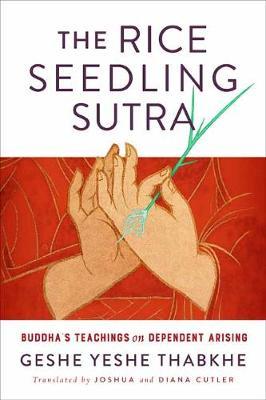Rice Seedling Sutra

Rice Seedling Sutra
One of Tibet's great scholars presents the Buddha's profound teachings on the laws of karma and dependent arising. In the Rice Seedling Sutra, the Buddha unpacks the law of cause and effect. He notes how in the natural world, a seed becomes a sprout, which produces a flower, which bears fruit. A seed has no intention to sprout; when the right conditions are assembled the fruit arises. Similarly, when our senses encounter an object, a sense consciousness arises naturally, without our intending it. This, says the Buddha, is also how karma works and how actions performed out of ignorance create suffering, whether we want it or not. And this same law of causality also governs enlightenment--when the right conditions are assembled, awakening is assured. In many sutras like this one, the Buddha explains that to understand his Dharma is to understand dependent arising. Geshe Yeshe Thabkhe explores dependent arising, and the corollary teaching of emptiness, through this sutra and others. Commenting on the works of Indian masters such as Shantaraksita, he shows how belief in a creator god is incompatible with dependent arising, and by illuminating the teachings of Nagarjuna and Chandrakirti, he shows how we do--and do not--exist. Geshe Yeshe Thabkhe was among the last generation of scholars to be trained in Tibet before the Chinese occupation. He has been teaching Westerners for decades, having worked with top scholars in the United States, and he is especially familiar with this sutra, having translated the commentary by Kamalasila into Hindi. Here his deep familiarity, combined with his extensive command of the Buddhist scriptures, allows him to present the Buddha's words in a rich and authoritative context.
PRP: 115.13 Lei
Acesta este Prețul Recomandat de Producător. Prețul de vânzare al produsului este afișat mai jos.
103.62Lei
103.62Lei
115.13 LeiLivrare in 2-4 saptamani
Descrierea produsului
One of Tibet's great scholars presents the Buddha's profound teachings on the laws of karma and dependent arising. In the Rice Seedling Sutra, the Buddha unpacks the law of cause and effect. He notes how in the natural world, a seed becomes a sprout, which produces a flower, which bears fruit. A seed has no intention to sprout; when the right conditions are assembled the fruit arises. Similarly, when our senses encounter an object, a sense consciousness arises naturally, without our intending it. This, says the Buddha, is also how karma works and how actions performed out of ignorance create suffering, whether we want it or not. And this same law of causality also governs enlightenment--when the right conditions are assembled, awakening is assured. In many sutras like this one, the Buddha explains that to understand his Dharma is to understand dependent arising. Geshe Yeshe Thabkhe explores dependent arising, and the corollary teaching of emptiness, through this sutra and others. Commenting on the works of Indian masters such as Shantaraksita, he shows how belief in a creator god is incompatible with dependent arising, and by illuminating the teachings of Nagarjuna and Chandrakirti, he shows how we do--and do not--exist. Geshe Yeshe Thabkhe was among the last generation of scholars to be trained in Tibet before the Chinese occupation. He has been teaching Westerners for decades, having worked with top scholars in the United States, and he is especially familiar with this sutra, having translated the commentary by Kamalasila into Hindi. Here his deep familiarity, combined with his extensive command of the Buddhist scriptures, allows him to present the Buddha's words in a rich and authoritative context.
Detaliile produsului










